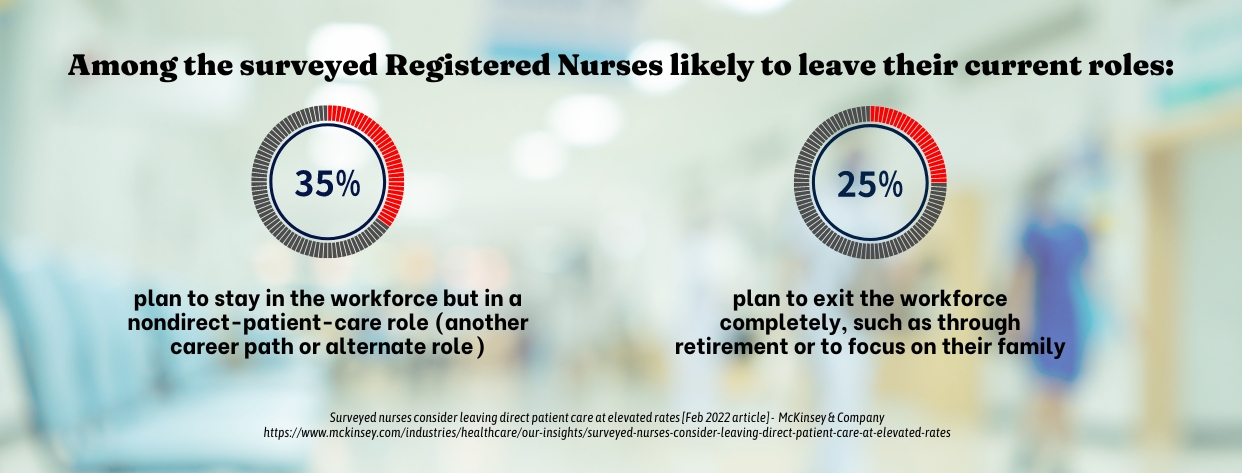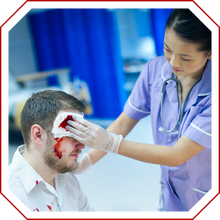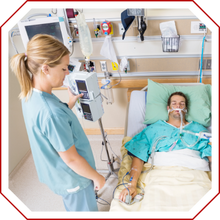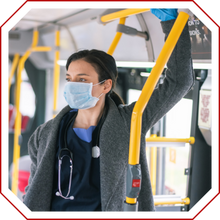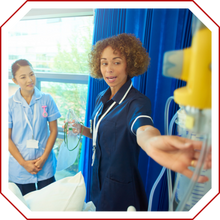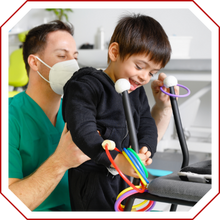Find Your Perfect School
Many are called, but few are chosen… This adage applies to nursing, which is as much of a calling as a career path. Nurse practitioners are expected to be passionate about caring for other people. You must be willing to undergo rigorous training for years to provide the best healthcare services to patients. Most of all, you need actually to enjoy making a difference in other people’s lives.
The nursing profession is a lucrative and rewarding career. It’s a highly in-demand occupation and has been hailed as the number one profession! The United States Bureau of Labor Statistics also states that the number of registered nurses in the country will grow by 6% from 2022 until 2032.
Being a nurse is exciting and challenging. It can be exhausting, too! As a nurse, you’ll be on your feet, attending to patients. It is, therefore, a physically demanding job—and not everyone is cut out for it!
Despite the struggles of working as a nurse, many people find it rewarding. Making a difference in a person’s life, especially if you helped save someone from the brink of death, makes all the hard work worth it. According to Marian University, having “a positive effect on the lives of patients” every day is one of the main reasons many dedicate their whole lives to being a nurse.
Check this out: The Best In-Person Nursing Schools in America
Nurses Career Changes
As already mentioned, the nursing career can be quite challenging. While it is a fulfilling and rewarding job for many who follow such a path, some may find the profession too much for them. A few may consider making career changes for nurses for personal or professional reasons.
Some of the most common reasons why nurses might want to switch to a different career include the following:
- You may be interested in pursuing a different career path in another field or specialty.
- You want a better work-life balance.
- Your goal is to learn new skills in another area of healthcare.
- You realized your current work environment does not align with your career goals and core values.
- You’re no longer happy with your current workload, schedule, or responsibilities.
- You wish to find a more exciting profession.
How do Nurses Know When It’s Time to Take That Leap?
It’s possible that what you’re feeling toward your profession as a registered nurse is only due to stress because of your current workload or schedule. This is why you must take the time to assess your situation and evaluate the different aspects that may be causing you to come up with such an idea. This is to ensure that you’ll be able to make an informed decision before you jump ship.
To determine whether you must make that career change now or not, follow these steps:
Think about what you like and don’t like about your current role.
- Are you unhappy with the work environment? Are you close with your colleagues?
- Are you okay with your work schedule and responsibilities?
- Are there specific regulations and procedures that you might not be comfortable with?
Look for the best options for your career change.
List at least five of the best roles you can take on. Then, list the pros and cons of each option, and ask yourself:
- How would this new career make me feel fulfilled?
- What problems will I most likely encounter if I switch to this job?
- Will this job help me with my career and personal development goals?
- Will this job affect other aspects of my life?
- What will I lose if I switch to this kind of career?
Consider the skills you have developed through nursing and determine whether you could utilize them in other industries.
A nursing degree will teach you about patient care, medical terminologies, life sciences, and more. You’ll develop nursing skills that may also be helpful in other fields. This is why you must look into your current skillset to determine whether you have the edge over other applicants.
Additional Info: The Most Lucrative Nursing Careers
Best Career Changes For Nurses
Nurses are very intelligent, hard-working, and dedicated people. They are also great at communication, have a high emotional quotient, critical thinkers, are team players, are resourceful, and are excellent at time management, all valuable and transferable skills that can be used in any role. What’s more, there are many other career paths that nurses can consider, according to Nurse.org.
Here are outstanding career options for nurses:
Medical Research Analyst
Medical Research Analysts plan and analyze various aspects of healthcare. You’ll be using statistical and epidemiological data and then examining and validating its accuracy to ensure that the information you have gathered is meaningful and valuable to the industry.
As you collect data, you’ll use analytical, statistical, and mathematical models to determine the effectiveness of new devices, processes, or medications. You’ll be working with medical experts, helping ensure that the rights and welfare of human beings are protected. Moreover, you’ll also need to report your findings, comply with protocols, and follow guidelines from regulatory authorities.
Qualifications:
- Bachelor’s degree in any bio-medical field, clinical field, or health sciences
- Registered Nurse or equivalent training
- Experience as a research associate in a university
- Background in clinical research introduction and exposure to standard medical procedures
- Clinical research certification from SOCRA
Hospital Quality Improvement Coordinator
As a hospital quality improvement coordinator, you will help manage the evaluation, implementation, and development of the hospital’s overall quality improvement (QI) program, including its nursing, medical, and ancillary departments, to discover trends, decrease duplication, prioritize and recommend improvements, and comply with the prevailing rules of the Joint Commission on Accreditation of Healthcare Organizations.
Vital to the healthcare industry, these professionals are also responsible for investigating patient care issues and complaints, incident reports, and other issues that the supervisor may request.
Qualifications:
- State nursing license
- Bachelor of Science in Nursing or graduate of an accredited program of clinical specialty
- At least three years of experience in clinical nursing with one year in surgical nursing
Forensic Nurse
Forensic Nurses are registered nurses with distinctive training and specialized education in providing care to victims of violence. You’ll be the first point of contact between the victim and the healthcare system. You’ll be collecting physical evidence needed for criminal investigations.
You are expected to consult and cooperate with law enforcement authorities and may even be called to testify as an expert witness in court. You can also be a legal nurse consultant and work directly within the legal system, providing expert opinions to help lawyers with their cases. The International Association of Forensic Nurses emphasizes that this job requires professionals to “first become a nurse.”
Qualifications:
- Bachelor of Science in Nursing
- Pass the National Council Licensure Examination (NCLEX)
- Relevant experience in clinical nursing with a background in medical-surgical, psychiatric, or pediatric nursing
- Certificate in Nursing Forensics
- Completion of provider-specific training
- Post-graduate studies for career advancement
Case Manager
A case manager is a patient advocate who guides, coordinates, and supports care for patients and their families or caregivers throughout their health journey, according to the Case Management Society of America.
As healthcare professionals, Case Managers attend to patients before they are discharged to ensure their medical records are all checked. They also provide all the take-home medications for patients and set follow-up appointments set up for them. As a patient advocate, you will also be working with other facilities or departments for patients’ smooth transition of care.
Qualifications:
- Active Registered Nurse license
- 2,000 clinical hours
- 30 hours of continuing education
- Two years of full-time practice
- Master’s degree (to further your career advancement)
Nursing Informaticist
Nursing informaticists are the backbone of technology-driven care. You can become a nursing IT if you are passionate about nursing and information technology. You will help ensure that quality improvement efforts continue to support positive patient and clinical outcomes.
You will constantly communicate with clinical and IT staff, focusing on developing breakthrough strategies for health IT procurement, maintenance, implementation, and optimization. You will still be walking the floor and observing how providers use technology to help them identify gaps and develop solutions to support patients further.
Qualifications:
- Active Registered Nurse license
- Completion of relevant certification programs
- Master’s degree
- Two years of full-time practice
- Completed a minimum of 2,000 hours in informatics nursing within three years
Medical Sales Representative
Also known as a pharmaceutical sales representative, you will be responsible for selling prescription drugs and devices to medical professionals. You will need to set up meetings with different medical experts to present company products and negotiate prices. You must also be able to identify customers’ needs so you can recommend the products that will best fulfill their needs.
Medical sales representatives also provide after-sales services and maintain solid relationships with existing and potential customers. A medical sales representative must also research competitor products, attend industry events and training, and prepare sales reports.
Qualifications:
- High school diploma or GED
- Certified Sales Professional (CSP) certification
- Bachelor’s degree in communications, marketing, medical office management, or a related field
- Valid driver’s license
- Knowledge of medical legislation and terminology
Travel Nurse
According to St. Catherine University, a travel nurse takes “temporary nursing positions in high-need areas.” When the COVID-19 pandemic hit, there was a shortage of staffing nationwide. This increased demand for travel nurses to jump into clinics, hospitals, and other facilities with an overwhelming need for appropriate health services and quality care. If you transition into a travel nurse, you are expected to jump into roles at understaffed healthcare facilities.
You will perform all the responsibilities of a conventional nurse with little context for care. It means you’ll be working in a fast-paced and chaotic environment often. However, being a travel nurse has many perks. For one, you’ll get a competitive salary, bonuses, assistance in obtaining passports/visas, and travel reimbursements, to name a few.
Qualifications:
- ASN or BSN degree
- Passed the NCLEX
- Relevant experience
- Nursing license
- Affiliation with a travel nurse staffing agency
Clinical Application Specialist
A clinical application specialist will train and support healthcare facilities, such as hospitals, clinics, nursing homes, and medical universities, teaching staff to use healthcare technology, from different software to imaging systems. You will also help health organizations implement and maintain new electronic devices.
You will also work with homeward patients and their families or caregivers, installing or setting up necessary devices and demonstrating how to use them. You may also be tasked to lead workshops and seminars on how to properly use specific medical apparatuses and software. Moreover, you will need to troubleshoot, maintain, and optimize software programs and devices.
Qualifications:
- (Minimum) Associate in Computer Science or Health Information Technology
- Bachelor’s degree in information science, computer science, or engineering
- Nursing license
- Relevant experience
- Master’s degree
Nursing Educator
A health educator is a registered nurse with advanced education and extensive clinical experience. A health education specialist also serves as a faculty member in a teaching hospital or nursing school, where you will share knowledge and skills with future nurses. Nurse educators also develop lesson plans, teach courses, serve as role models, oversee students’ clinical practice, and evaluate educational programs.
Health education specialists work with a pediatric, geriatric, or informatics nursing focus. It’s also vital that you keep yourself updated with new nursing methods and technologies. What’s more, you may also advance to writing or reviewing textbooks, managing education programs, or developing continuing education programs for educating patients and the public.
Qualifications:
- Bachelor’s degree in Nursing
- Active license
- Relevant work experience
- Master’s degree or doctorate
- Post-master’s certificate
Nurse Manager
The role of a nurse manager involves managing and overseeing nursing staff in a hospital or any healthcare facility. You will be responsible for creating work schedules for employees, policies, and annual performance reviews.
You will collaborate with medical staff, develop educational plans, handle disciplinary actions, serve as a liaison between hospital administration and employees, interview and hire new nurses, oversee daily operations, and train new nurses, among others. This means that your function as a nurse manager is more of an office setting and not a clinical unit.
Qualifications:
- Bachelor of Science in Nursing
- Master’s degree
- Relevant bedside experience
- Nurse manager certifications
- Experience in a mid-level administrative or faculty position or executive consultation position
Nanny
A nanny that has a background in nursing is highly in-demand. Families tend to be more confident entrusting their children to someone with experience in healthcare. Aside from that, a nurse that has transitioned into a nanny will be able to maintain a safe environment, administer medication, and attend to a child’s medical needs. This is especially true for children with special needs.
Some parents may only be comfortable with hiring those with nursing experience and clinical skills. As a nanny, your work will involve assisting and supporting breastfeeding mothers, bathing, feeding, breast pump preparation, breastmilk storage, burping, restocking the nursery, baby laundry, documenting nightly events, and more.
Qualifications:
- Associate’s in Nursing or Bachelor of Science in Nursing
- CPR certification
- Nannying experience
- Valid driver’s license
Health Coach
If you choose to become a health coach after leaving the nursing profession, you can be employed by health insurance firms, weight loss companies, wellness centers, and the like. As a health coach, you may offer coaching on behavior, physical fitness, and healthy habits, to name a few.
You can advise clients on illness management, nutrition, stress reduction, weight loss, smoking, and addiction. You can offer cognitive-behavior therapy (CBT) and motivational techniques to help clients deal with mental problems, sleep better, and more. You must also provide your patients with the necessary tools to improve their overall health and well-being.
Qualifications:
- Bachelor’s degree in nursing, geriatrics, or behavioral therapy
- Certificates from accrediting agencies, such as the National Commission for Certifying Agencies and Accrediting Bureau of Health Education Schools
- Relevant experience
- Thirty hours of continuing education
Dietitian
Being a registered dietitian is a popular career choice for those in the health and wellness industry. You can work in a medical facility or hospital and provide nutritional advice to patients. You may also work with government entities, educational institutions, or government entities and provide population-level nutritional care.
Qualifications:
- Bachelor’s degree in nutrition or a relevant field
- Completion of dietetic internship
- Ace the Commission on Dietetic Registration (CDR) test
- Active state license
Personal Fitness Trainer
If you’re dedicated to helping people become healthier and reach their fitness goals, you can switch to being a personal fitness trainer. By also applying the skills of physical therapists, You will develop effective and safe fitness programs, assist clients in nutrition, and improve people’s lives in the end.
More importantly, you will need to implement fitness training regimens, introduce clients to workout routines that fit their skill levels and needs, and keep up with the latest fitness and nutrition recommendations.
Qualifications:
- High school diploma or GED
- Completion of Automated External Defibrillator (AED) and Cardiopulmonary Resuscitation (CPR) certifications
- A fitness specialty
- Obtain certification from the National Commission for Certifying Agencies (NCCA)
Anyone looking for a career that empowers people promotes social change and development, and studies and understands human behavior should be a social worker.
In this profession, you’ll be working with institutions and communities to provide social impacts on civil rights, child abuse, workers’ compensation, disability pay, unemployment insurance, mental health stigma, and Medicaid and Medicare. Clinical social workers focus on those living in poverty, oppression, and vulnerability.
Qualifications:
- Bachelor’s in Social Work or a related discipline
- Master’s Degree in Social Work (MSW) or equivalent program
- Completion of the ASWB examination
- Continued learning
- Completion of fieldwork hour requirements
- State Social Work license
In Conclusion
Before you hand out your resignation to transition into a different career path? These tips will make sense:
- Assess your transferable skills, whether it be being organized, having an analytical mind, or being systematic. Carefully explore how your career options match these strengths.
- Evaluate how you can put all those skills into practice, which made a significant contribution to a patient’s life.
- Consider investing in yourself to learn or enhance a skill that will make you a valuable asset to the next company you will be working for.
Before you go, check this out: The Best Online BS in Healthcare Administration Degrees

